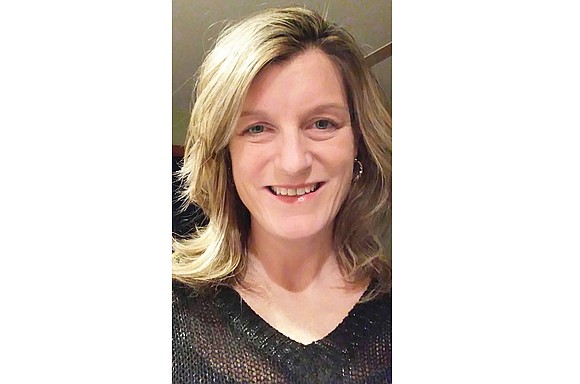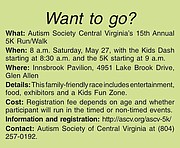Personality: Dr. Staci E. Carr
Spotlight on president of Autism Society Central Virginia
5/19/2017, 8:16 p.m.
Dr. Staci E. Carr is passionate about helping individuals and families living with autism spectrum disorder.
She says that from a young age, she knew she wanted to help people. As a psychology student in 1994, she began working with a 9-year-old girl diagnosed with autism and was driven to learn more about the subject.
When she moved to Richmond in 2001, she had been working in the field as a autism consultant and researcher on topics such as skill development, sexuality and autism and evidence-based practices for intervention.
Now, she is using her knowledge about autism in volunteer service on the board of the Autism Society Central Virginia. She got involved with the board in 2015 and became its president earlier this spring.
“I am honored to be president of the board, and am eager to work with the amazing staff and board members to continue the work that we do to help all those affected by autism,” Dr. Carr says.
As president of the organization, she is leading the nonprofit’s 15th Annual 5K Run/Walk scheduled for Saturday, May 27, at Innsbrook Pavilion.
The event is the ASCV’s primary fundraiser thanks to the help of more than 150 volunteers. Last year, more than 1,600 participants ran or walked in the event, with the organization raising more than $100,000 to help with its mission of educating, advocating and supporting individuals with autism spectrum disorder and their families.
A 2014 report by the Centers for Disease Control and Prevention concluded that the prevalence of autism was 1 in every 68 births in the United States and almost 1 in 42 boys, a rate that continues to rise.
Dr. Carr says three major areas are examined to evaluate whether a person has autism — communication, behavior and social interaction. Signs of autism include impairments in social communication and interaction and repetitive patterns of behavior.
The disorder often is under-diagnosed among African-Americans, she says, because evaluators tend to look more at behavior. This can lead to misdiagnoses, she says, such as having an emotional disturbance, attention deficit disorder or other disorders.
Additionally, she says, some physicians may dismiss parents’ concerns about their child, while other parents may rely on public school systems to recognize that their child has autism.
The Autism Society Central Virginia, she notes, can provide parents and families with information and referrals, individual and family support and education through a variety of workshops.
Meet this week’s Personality and advocate for those with autism, Staci E. Carr:
Date and place of birth: March 23 in Warren, Mich.
Occupation: Technical assistance coordinator, VCU Autism Center for Excellence.
Current residence: Brandermill in Chesterfield County.
Education: Master’s and doctoral degrees in psychology, Virginia Commonwealth University; master’s of education, Harvard University.
Family: Daughter, Morgan, 15, and son, Peter, 11.
When Autism Society Central Virginia was established: Early 1990s.
Mission of ASCV: To improve the lives of all affected by autism by maximizing self-sufficiency, independence and quality of life.
When I was elected ASCV board president: Spring 2017.
Length of term: Two years with up to three terms in succession.
When and why I got involved: I have been involved since I moved here 16 years ago. When I moved to Richmond, I knew that I wanted to help a local organization in addition to my job in the field.
What is autism? A lifelong developmental disability that is usually apparent during the first three years of life and affects a person’s ability to communicate and interact with others. Autism is defined by a certain set of behaviors and is a “spectrum disorder” that affects individuals differently by varying degrees. There is no known single cause for autism. We do know that early intensive intervention often leads to the best outcomes for those with an autism diagnosis.
Importance of family support: Families supporting one another with support from organizations builds a community of understanding, acceptance and hope. There are always parents of newly diagnosed children and caregivers of teens and adults across the spectrum who can offer advice and share experiences.
Biggest challenges: Continuing growth of our services by adding staff and getting more office space. We are a nonprofit and run on a very tight budget, so we need more funding. Our goal, though it may be a lofty dream, is to meet the needs of everyone touched by autism.
We could do more if: We had more funding and staff.
Best late-night snack: Granny Smith apples and Swiss cheese.
Three words that best describe me: Dedicated, passionate and open-minded.
Greatest source of inspiration: My two children. They are kind, compassionate, accepting and open-minded. They don’t see differences; they see similarities.
I knew I was all grown up when: I moved to New York City to work for a company that provided in-home services for children with autism. That was in 1996. I was leaving Michigan, my family and my home to follow my heart. This was my first adult move. I was in charge for my own rent, food and transportation. I was 21, with a lot to learn.
The book that influenced me the most: “Let Me Hear Your Voice: A Family’s Triumph Over Autism” by Catherine Maurice. The book is about a little girl with autism and her parents’ journey from diagnosis.
What I’m reading now: First, for pure pleasure, “The Magnolia Story” by Chip Gaines, Joanna Gaines and Mark Dagostino, and “Living Sensationally: Understanding Your Senses” by Winnie Dunn.
If I’ve learned one thing in life, it is: Listen with an open mind and heart!








